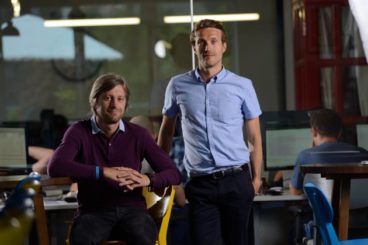
Director’s Note: I had heard of reconciliation efforts by churches, schools and communities, but I never heard of an example in business until I saw Dorcas Cheng-Tozun’s article. It is such a compelling picture of a way that someone creatively re-imagined their business, in order to live out these reconciliation values. And that’s what I hope CSA will be about, stirring up the imagination, so that many people, in many different fields, can think creatively about what it looks like to love God, and to love God’s people, and to pursue justice in the places where they are. – Nikki Toyama-Szeto
By Dorcas Cheng-Tozun
Muamer Cisija was only a young boy when the Bosnian War of the 1990s hit his hometown. He and his family fled to Denmark, and he eventually ended up in the MBA program at Stanford’s business school. Now he’s demonstrating that business can not only develop economies, but it can also bring people together in powerful ways.
Using his education and his connections, Cisija partnered with co-founder Haris Memic in 2009 to build the fast-growing software firm Symphony. They collaborate with some of Silicon Valley’s most recognized names, augmenting these companies’ projects with additional engineering expertise from the Balkans.
So why are we telling their story?
A company culture that heals old wounds
This work sounds like standard high-tech fare, except for one important difference: Cisija and Memic see their business as a culture-driven technology house. And a big part of that culture is using Symphony as a platform to address economic and social wounds from that long-ago conflict.
Symphony’s first office was established in Sarajevo, the capital of Bosnia and Herzegovina. Cisija and Memic knew that their fellow Bosnians have plenty to offer in the way of skill and talent. What they lack is opportunity.
Today, the unemployment rate in Bosnia and Herzegovina is a staggering 40 percent. The youth unemployment rate has approached 60 percent in recent years.
As a result, many educated Bosnians leave the country—typically to Germany or the U.S.—in search of better professional opportunities. To help stem the brain drain, Cisija and Memic want “to create ecosystems where they are,” and “democratize access to great work.”
They have worked hard to make their company as attractive as possible to talented engineers: modeling their office design after Google’s workplaces, prioritizing opportunities for growth and travel, and offering the chance to collaborate with renowned Silicon Valley firms on leading-edge projects.
Reaching across national boundaries to build a professional community
But the entrepreneurs took their vision one step further. When they were ready to expand operations to a second office, they chose to locate it in Belgrade, the capital of Serbia, which still has an uneasy relationship with Bosnia more than twenty years after the war. (Serbia has a more modest unemployment rate of 13 percent, but the threat of brain drain is just as real there.)
Rather than siloing these two offices to avoid potential ethnic conflict, Cisija and Memic intentionally bring their Bosnian and Serbian teams together. They collaborate on the same projects. Employees from one country are regularly sent to work in the other country, facilitating the development of close one-on-one relationships with their colleagues.
Rather than siloing these two offices to avoid potential ethnic conflict, Cisija and Memic intentionally bring their Bosnian and Serbian teams together.
“There is a mutual respect and welcoming,” Cisija explained to me. “They engage as engineers, not based on nationality. They ask, ‘What can we achieve together?’”
This kind of collaboration doesn’t happen by accident. Symphony recruits employees who demonstrate empathy and openness; the company promotes a culture of feedback, learning, and growth.
Symphony has taken the best of what Silicon Valley culture has to offer—innovation, teamwork, diversity, empowerment—and applied it in a context that has been defined more by economic struggle and social mistrust.
Replacing prejudice with respect
Not only do the company’s employees take pride in the high-level work they do, but Cisija reported to me that he regularly observes old ethnic stereotypes and prejudices fall away. In its place, he sees trust, camaraderie, and respect.
“They realize how similar people are across cultures,” Cisija said. And they see the value of diversity. “Every region has its strengths and brings a uniqueness to how they think. It’s additive.”
As one of their Serbian software engineers, Djuro Alfirevic, testified, “I am proud to work alongside incredible professionals here in Bosnia and Serbia, and in partnership with teams around the world.”
Old ethnic stereotypes and prejudices fall away [to] trust, camaraderie, and respect.
The software business currently has 85 employees across its two offices and is already planning its expansion into another Balkan country, Macedonia. According to Cisija, “It’s another untapped pool of talent.”
And it provides Symphony yet another opportunity to tear down cross-cultural barriers and to grow their global community of engineers.
Dorcas Cheng-Tozun covers how startup life affects marriage, family, and personal well-being, based on more than 17 years of partnership with her entrepreneur-husband, Ned Tozun. Her book, Start Love Repeat: How to Stay in Love with Your Entrepreneur in a Crazy Startup World, will be published by Hachette Center Street in late 2017. Dorcas’s award-winning writing has appeared in The Wall Street Journal, the Unreasonable Institute, BlogHer, and dozens of other publications. Previously a nonprofit and social enterprise professional, she served as the first director of communication and human resources for d.light, one of the world’s leading social-benefit companies. A native of Silicon Valley, Dorcas has also lived and worked in China, Hong Kong, and Kenya. This article first appeared on Inc.com and is reprinted here with permission.


